


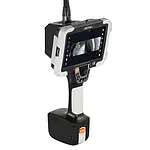



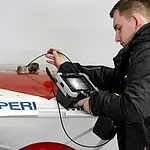









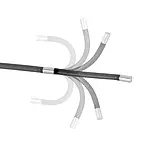
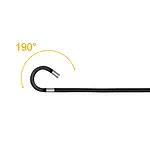
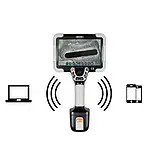


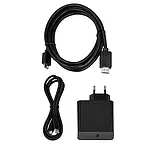


Bilingual Technical Support (EN / ES)
Public Service, Military and First Responder Discount
30 Day Return Policy
2 Year Warranty
Free Standard Shipping (US)
This automotive tester is the only device in the PCE-VE 1500 series that is equipped with two cameras. One of them faces the front and the other faces the side. Both are positioned very close together on the camera head. An LED is arranged next to each of the cameras, with which the field of view can be illuminated if required. Settings on the endoscope for the image representation on the display and for the lighting of the camera field of view are effective for both cameras and both light sources at the same time.
The user can choose at any time whether the automotive tester shows the current image from the front camera, the side camera or both side by side on the large touchscreen display. The simultaneous display of both cameras makes orientation during the visual inspection much easier. In addition, it is advantageous to be able to use both the front and the side camera, especially when space is very limited.
However, pictures and videos cannot be taken simultaneously with both cameras. When recording in the viewing mode in which both cameras can be seen, only the images from the activated camera are saved by the endoscope. If the user has activated image captions, then these only appear on the image of the activated camera. By default, the boroscope offers under the menu item Watermark, for example, overlays such as the date and time or the camera designation as CAM1 or CAM2. When the camera is activated, the selected captions appear in small red font at the edge of the image. If the other camera is to be activated, this is very easy to do with this endoscope via the touchscreen. All you have to do is double-tap on their image in the view in which the images from both cameras are shown side by side.
The flexible endoscope cable, which is only 3.8 mm thick, is approx. 1.87 meters long from the front edge of the camera head to the rubber coating in the connection area. This means that internal surfaces and parts that are only accessible through very narrow openings can also be examined in detail with this boroscope. The camera head, which can be bent in all directions using a joystick, has a length of 42 millimeters and a bending radius of 35 mm at a bending angle of 90 degrees.
Special features of the PCE-VE 1500 series
Each automotive tester in this series has the same basic device with extensive functions and useful accessories. The individual models differ only in the different cameras and the lengths and diameters of the camera cables. The operation of these endoscopes is very convenient thanks to the function keys, touchscreen and joystick on the basic device.
With the battery and camera unit, the automotive tester weighs just over two kilograms. The device can easily be carried with one hand. Depending on the environment, the shoulder strap, a magnetic holder or a tripod can also be attached to the attachment points provided for longer periods of use. While the endoscope is held with one hand, the joystick and the function keys on the handle can also be operated with the same hand. These function keys include the picture trigger and the light intensity control key for the camera's field of view. The camera cable can be guided with the other hand.
Exchangeable endoscope cable with motor
One of the standard features of these automotive testers is the motorized movement of the camera head. That's why the camera, camera cable and motor are designed as a single unit. This complete camera unit can be easily replaced if necessary. The connection to the basic device of the endoscope can be fixed and released again very easily. To increase durability, the cable is covered with tungsten braid and the tip of the camera head is made of titanium alloy.
Control of the camera head via joystick
The camera head of the automotive tester can be moved with the joystick in order to use the camera's angle of view to precisely capture the areas that are to be examined. The movable camera head can be bent in all directions, in places by more than 180 degrees. The joystick is designed and placed between the handle and the display so that it can be easily operated with just one finger.
Touchscreen functions
The automotive tester not only shows the current and saved images individually on the seven-inch display. With the picture in picture function, it also allows the current picture to be compared with a saved one. As a touchscreen, the monitor also offers very easy and quick access to the menu functions. The diverse functions that the borescope offers for marking details and placing annotations on the images would hardly be usable without the touchscreen.
The current and saved images can be digitally enlarged several times on the display. All you have to do is double-tap the image or pull it apart with two fingers. If necessary, the enlarged section can be moved with your finger on the touchscreen. This allows the complete image to be checked directly on the endoscope. Important details on saved images can be immediately circled in colour, marked with arrows or labeled on the touchscreen. These tagged images can then be saved under the old name or as additional images.
With the icons for the additional functions, it is possible to operate the automotive tester intuitively via the touchscreen. With the help of the picture-in-picture function, for example, the current live picture can be compared with a picture that has just been “frozen” or with a picture that has been saved earlier. By default, the live image appears as a section at the top right. Double tapping it will make it the big picture and the older picture will switch to the top right.
Interfaces
The automotive tester has the following connections for data transmission: USB-A, USB-C, HDMI, audio, WiFi and a memory card slot for SD cards up to 128 GB. All interfaces are arranged in the basic device to the left of the touchscreen under a cover.
| Diameter | 3.8mm / 0.15" |
| Cable length | 2 m / 6.5 ft |
| Camera direction | 0° and 90° |
| Resolution | 160,000 pixels |
| Focusing range | 5 ... 50 mm / 0.19 ... 1.96" |
| Further specifications | |
| Material camera head |
titanium alloy |
| Material camera hose | braided tungsten |
| Material camera lens | glass |
| Field of view | 120° |
| Illuminance | 50,000 lux |
| Bending direction | 360° (4-way camera head) |
| Bending angle | 190° |
| Display | 7" LCD touchscreen |
| Display resolution | 1920 x 1200 pixels |
| Image format | JPG |
| Video format | MP4 |
| Image resolution | 1280 x 720 pixels |
| Video resolution | 1280 x 720 pixels |
| Digital magnification | 8 times |
| Memory (internal) | 16 GB |
| Memory (external) | expandable up to 128 GB for ca. 285,000 |
| pictures or 1500 minutes of video recording | |
| Interface | Mini HDMI, USB-A, USB-C (only for data transfer) |
| audio interface, WiFi | |
| Power consumption (endoscope) | 10 W |
| Operating time | >3 hours |
| Battery |
7.4 V (4 x 18650), 6400 mAh, removable |
| Battery (charging) | 12 VDC, 3 A |
| Mains adapter | primary: 100 … 240 VAC 50/60 Hz, 1.5 A |
| secondary: USB-C (PD) 65 W maximum | |
| 5 VDC, 3 A | |
| 9 VDC, 3 A | |
| 12 VDC, 3 A | |
| 15 VDC, 3 A | |
| 20 VDC, 3.25 A | |
| PPS1: 3.6 … 11 VDC, 3 A | |
| PPS2: 3.6 … 20 VDC, 3 A | |
| Operating conditions (hand-held device) | 5 ... 50 °C / 41 ... 122 °F, <92 % RH, non-condensing |
| Operating conditions (endoscope cable) |
5 ... 80 °C / 41 ... 176 °F, <92 % RH, non-condensing |
| Storage conditions | 5 ... 63 °C / 41 ... 145 °F, <92 % RH, non-condensing |
| Dimensions | 366 x 194 x 137 mm / 14.4 x 7.6 x 5.3" |
| Weight | handset weight: 1017 g / 35.8 oz |
| endoscope cable with electric motor: ca. 600 g / 21.1 oz | |
| battery 550 g / 19.4 oz |